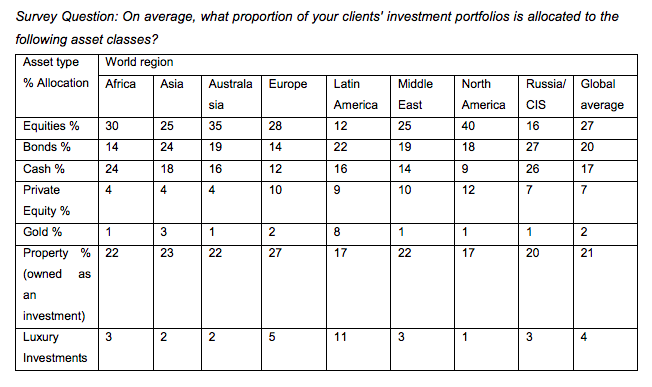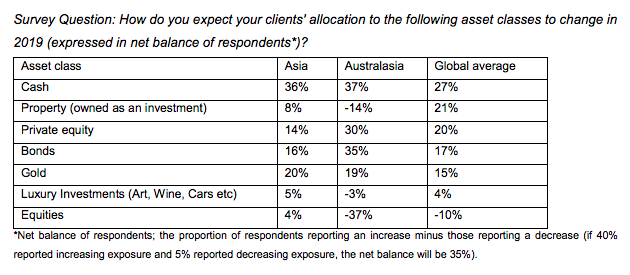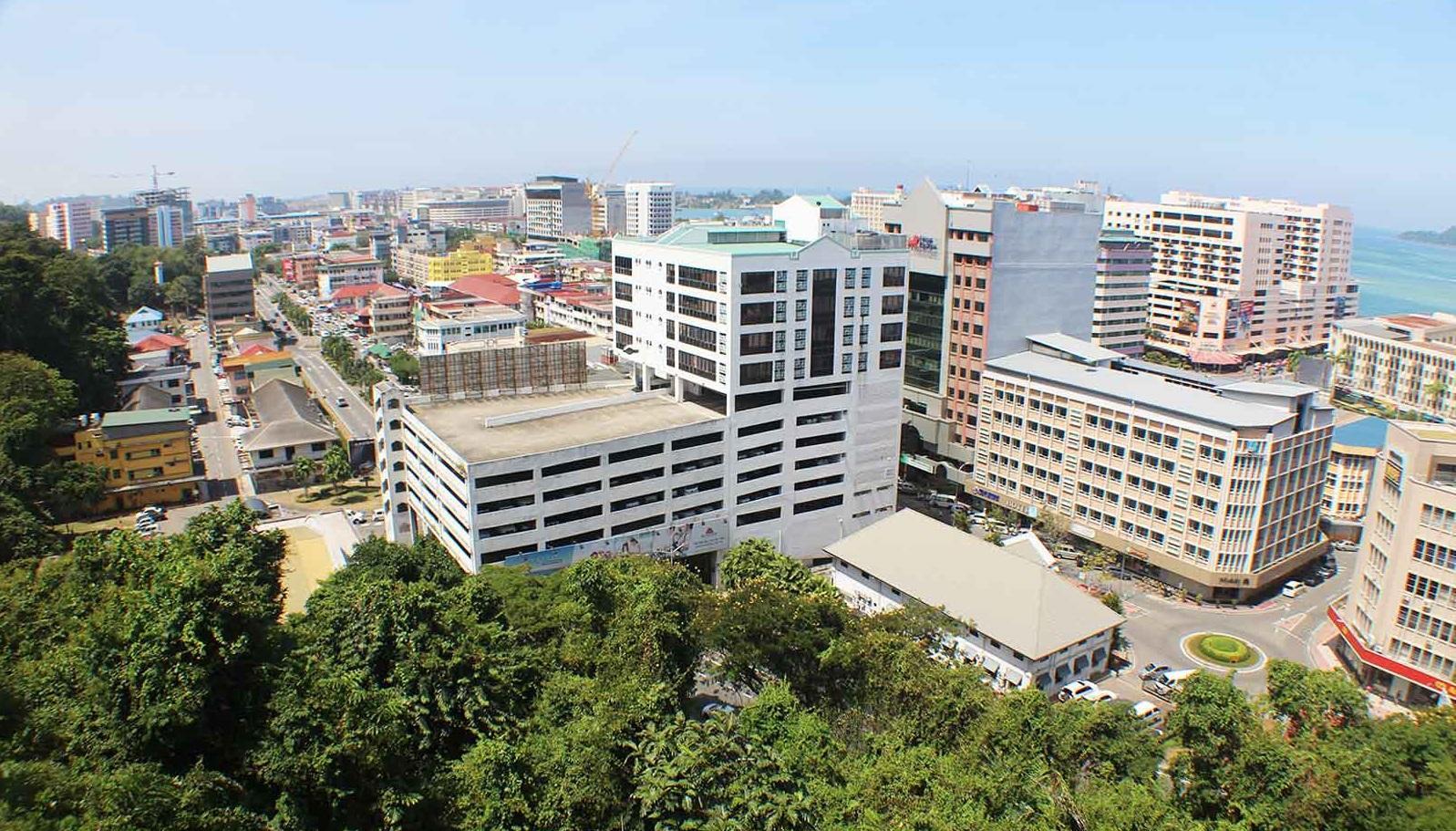According to the Attitudes Survey launched today in the Knight Frank Wealth Report, 63% of global respondents said the wealth of their ultra-high-net-worth individual (UHNWI) clients increased during 2018. Just over 20% reported no change, while 16% said it had fallen.
The survey is based on global responses provided by 600 private bankers and wealth advisers who between them manage over US$3 trillion of wealth for UHNWI clients. In Asia, the numbers showed a slightly more subdued growth, with 58% reporting an increase, 23% recording a fall and 18% who said there had been no change.
Survey question 1 chart is shown above in the gallery. Question 1: On balance, how has the wealth of your clients changed over the past 12 months?
Wealth Creation
UHNWIs in Australia saw the highest rise in wealth in 2018 according to their advisers, with 93% of survey respondents reporting an increase in their clients' fortunes. More than half of the Malaysian respondents (59%) cited an increase in client wealth. Malaysia wealth advisers were optimistic, with 78% of them expecting their clients' wealth to grow in 2019, although they expect continued market volatility to pose potential challenges to wealth creation and wealth protection.
In Malaysia, wealth managers are significantly more optimistic about their clients' prospect for growing and preserving wealth in 2019 as compared to 2018. According to the Attitudes Survey, 22% of wealth managers felt that the political and economic environment within the country would make it easier for clients to create and protect wealth in 2019, as opposed to merely 11% in 2018. This places Malaysia to be almost on par with India and Philippines, which are the top-performing markets in Asia.
Sarkunan Subramaniam, Managing Director, Knight Frank Malaysia says, "It is interesting to know that wealth managers in Malaysia felt that the 2019 political and economic environment within the country will make it easier for the UHNWI to create and protect wealth. This has to be associated with the change of Malaysia government since May 2018, and the confidence among UHNWI in the present government."
Commenting on the current investment environment, Dill Choo Chooi Lin, Head of Private Bank, UOB Malaysia, says that despite slowing global growth, opportunities across equity and fixed income asset classes remain but investors need to stay vigilant and to rebalance their investment portfolios to help manage risk.
"In the first quarter of 2019, global equities rebounded by 10 per cent, recovering most of their losses from the fourth quarter of 2018. Meanwhile, the clarity from the United States Federal Reserve (US Fed) on taking a pause to rate increases raises the attractiveness of fixed income investments. However, with markedly slower global economic growth and a challenging corporate business environment, investors should be discerning in their security selection and ensure a thorough understanding of the portfolio companies, including the factors that influence their long-term growth such as asset quality, earnings and revenue growth and its ability to outperform industry peers. In addition, investors should adopt a flexible and diversified asset allocation strategy that allows them to re-allocate between asset classes and geographies" says Choo.
UHNWIs in Australia saw the most significant increase in wealth in 2018, with 93% of the advisers surveyed reporting an improvement in their clients' fortunes, and 72% expecting their clients to become increase their wealth this year. Still, together with wealth managers in China, Hong Kong, Indonesia, South Korea, Taiwan and Singapore, they expect domestic politics and economic issues to make it more challenging to create and protect wealth in 2019.
"In early 2019, many of the trends that shaped the global economy in 2018 - from Brexit to trade tensions to financial market volatility - appear still to be prevalent. However, financial markets have long since priced in the implications of these widely-discussed events," says Nicholas Holt, Head of Research, Knight Frank Asia Pacific.
Asset Allocations
Amid a more cautious sentiment, the Attitudes Survey showed that Asia-Pacific's UHNWIs are expected to allocate more of their wealth to cash and less cyclical assets such as bonds and gold. 57% of Asian respondents and 59% of Australasian respondents expect allocations to cash to increase over the next 12 months, higher than the global average of 48%. Notably, wealthy individuals in China and Malaysia are expected to increase their exposure to gold, a typical 'safe haven' asset during times of uncertainty.
"Gold is hugely popular as an investment given it is typically viewed as a safe haven asset. With the US Fed ending its current rising interest rate cycle, at least for the time being, there is renewed confidence in gold. However, it is important to note that like other markets, the gold market can be subject to speculation and volatility. As such, at UOB Malaysia, we advise investors to follow the three essential aspects of portfolio management: diversification of risk, seeking undervalued opportunities and taking a long-term view," says Choo.
In India, where the volume of wealth is rising the fastest globally, UHNWIs in the country are expected to decrease cash exposure and increase their allocation to private equity in 2019 as local investors grow in sophistication.
Survey question 2 chart is shown above in the gallery. Question 2: On average, what proportion of your clients' investment portfolios is allocated to the following asset classes?
Property remains a mainstay of wealth portfolios
With prospects for capital growth and rental yields, the property remains a cornerstone of wealth portfolios across the region. According to the Attitudes Survey, real estate makes up 23% of UHNWI portfolios in Asia, higher than the global average of 21%.
In 2019, 28% of the survey respondents in Asia said they would be increasing their exposure to property, 42% said allocations would remain the same, while 20% said they would decrease - showing some profit taking in some markets.
The Philippines has the highest ratio of people who would buy compared to those who would sell in the coming year. 63% of respondents in the Philippines said that exposure to real estate would increase in 2019, compared to just 9% who expect allocations to decrease. In contrast, in Australia, 40% of the wealth managers surveyed expected allocations to the property to decline and 20% said there would be an increase over the next 12 months.
"We are seeing a rebalancing of portfolios away from equities towards more defensive asset classes, amid more cautious sentiment. While cash, gold and private equity are likely to be increasingly targeted, investment grade property with strong tenant covenants will also see the significant interest over the next 12 months," says Holt.
James Buckley, Executive Director, Capital Markets, Knight Frank Malaysia, says, "There is a lower correlation between real estate and the public markets so the property is well positioned to weather downturns and is an opportunity to diversify and reduce volatility in your overall portfolio. We see Malaysians continuing to invest in real estate in 2019, particularly diversifying abroad where there is a wider amount of investment grade property available."
Survey question 3 chart is shown above in the gallery. Question 3: How do you expect your clients' allocation to the following asset classes to change in 2019 (expressed in net balance of respondents*)?

.jpeg)




.jpg)

.png)



.jpeg)

